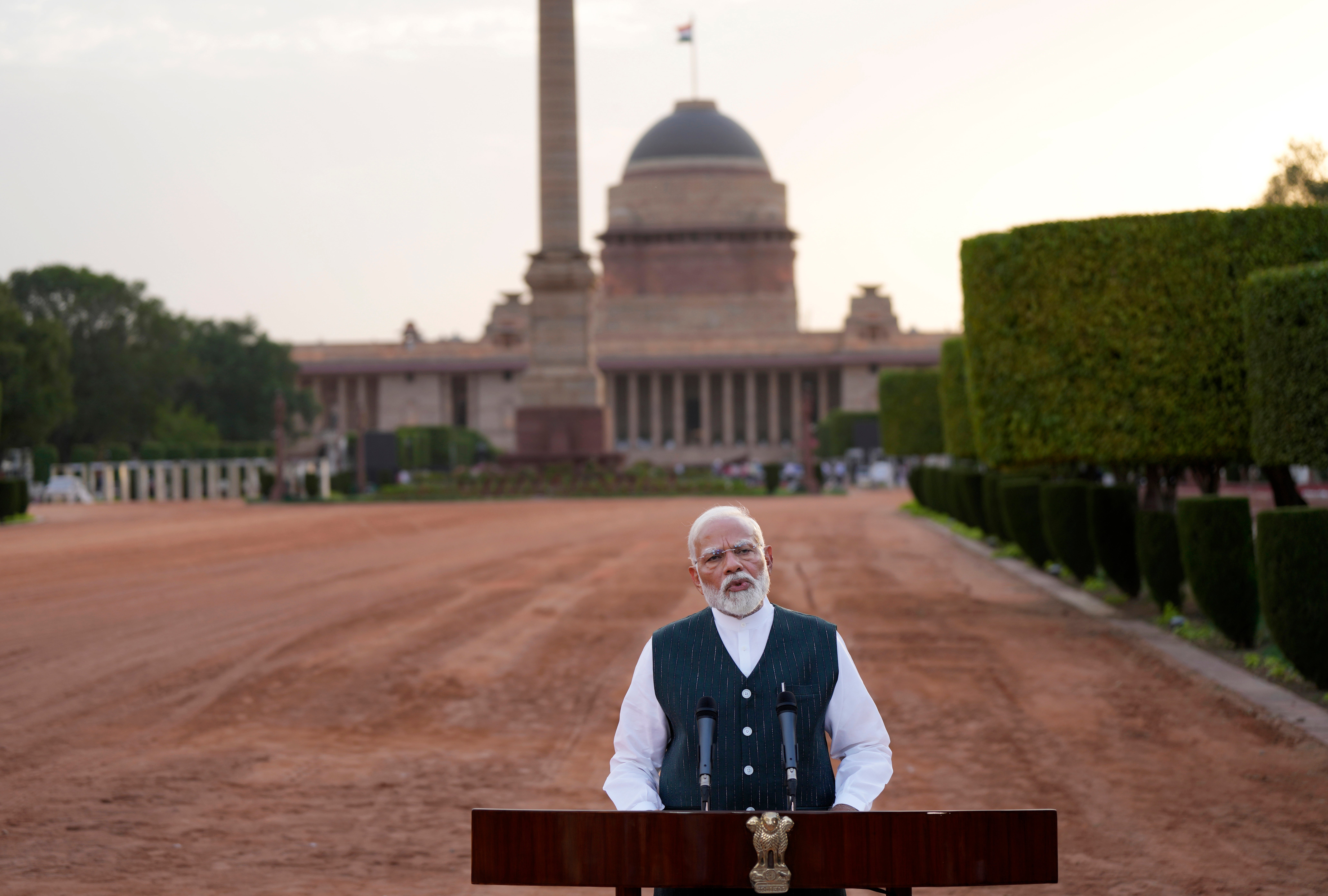Indian PM Modi names Cabinet for coalition government after his party lost majority
India’s Prime Minister Narendra Modi, newly sworn in for a third straight term, has named a Cabinet that retains his top ministers in crucial portfolios despite his Hindu nationalist party losing majority in a shock election result

Your support helps us to tell the story
From reproductive rights to climate change to Big Tech, The Independent is on the ground when the story is developing. Whether it's investigating the financials of Elon Musk's pro-Trump PAC or producing our latest documentary, 'The A Word', which shines a light on the American women fighting for reproductive rights, we know how important it is to parse out the facts from the messaging.
At such a critical moment in US history, we need reporters on the ground. Your donation allows us to keep sending journalists to speak to both sides of the story.
The Independent is trusted by Americans across the entire political spectrum. And unlike many other quality news outlets, we choose not to lock Americans out of our reporting and analysis with paywalls. We believe quality journalism should be available to everyone, paid for by those who can afford it.
Your support makes all the difference.India's Narendra Modi, newly sworn in for a third straight term, named a Cabinet on Monday that retained his top ministers in crucial portfolios despite his Hindu nationalist party losing their majority in a shock election result.
There was no change in the top four ministries. Subrahmanyam Jaishankar, who spearheaded the country's foreign policy for the last five years, was handed back his position as the External Affairs Minister. Amit Shah will continue as India's Home Minister, Nirmala Sitharaman will remain as the Finance Minister and Rajnath Singh will continue to be Defense Minister.
India's six-week-long election came to an end last week, in which Modi's Bharatiya Janata Party failed to secure a majority on its own after it won landslide victories in 2014 and 2019. However, his National Democratic Alliance coalition won enough seats to form the government, with him at the helm.
This is the first time the BJP under Modi has needed support from its regional allies to form a government after a decade of commanding the majority in India's parliament.
Final election results showed Modi’s BJP won 240 seats, well below the 272 needed for a majority. Together, the parties in the NDA coalition secured 293 seats in the 543-member lower house of parliament.
Modi, 73, is only the second Indian prime minister to win a third straight term.
On Sunday, he and 71 ministers took the oath of office at India’s presidential palace, Rashtrapati Bhavan, in New Delhi. 61 of them were from the BJP while the remaining were BJP's NDA allies. Only seven of them were women, and not a single one from the Muslim community, the largest minority group in India whose political representation as lawmakers has shrunk under Modi.
The results, which defied exit polls that predicted a landslide for the BJP, left Modi's coalition government largely dependent on two key regional allies — the Telugu Desam Party in southern Andhra Pradesh state and Janata Dal (United) in eastern Bihar state — to stay in power. On Sunday, two lawmakers from each party were sworn in as ministers.
The surprising drop in support for the BJP means Modi needs support from his regional allies to stay in power, and experts say he may have to adapt to a style of governance he is not used to.
An avowed Hindu nationalist, Modi is considered a champion of the country’s Hindu majority, who make up 80% of India’s 1.4 billion population. His supporters credit him with rapid economic growth and improving India’s global standing since coming to power.
But critics say he has also undermined India’s democracy and its status as a secular nation with attacks by Hindu nationalists against the country’s minorities, particularly Muslims, and a shrinking space for dissent and free media. His political opponents, who are now more emboldened than before, also rallied their campaign around his government's mixed economic record, pointing to high unemployment and growing inequality despite strong growth, which analysts say resonated with voters.